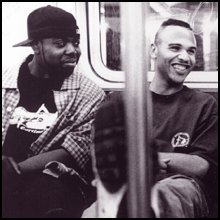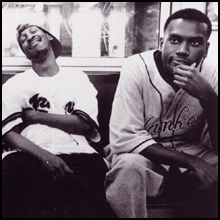![[Sidebar]](/standard/image/sidebar.gif)
![[Music Reviews]](/standard/image/headers/music_reviews_header.gif)
| clubs by night | club directory | bands in town | concerts | hot links | reviews & features |
Turntabling
The cut-and-scratch jazz of DJ Shadow and the X-ecutioners
by Matt Ashare
DJ Krush
There's a new category in Rolling Stone's recently published 29th "Annual Music Awards Issue," which also marks the 21st year the magazine has asked its readers (rather than just the critics) to weigh in on such matters -- a category that didn't appear last year, when "Best Electronic Artist" made its debut in the polling. This year's newcomer is "Best DJ," and it's one of the few places the readers and the critics agreed on a winner. Both elected DJ Shadow (a/k/a Josh Davis), a California kid who first made his presence known outside the rarefied singles-based realm of DJ culture in late '96, with the album-length CD Entroducing . . .Agreement on such matters tends to occur only in highly specialized categories, where the focus is narrowed down to just a handful of worthy choices (i.e., artists with recognizable names who had both a cultural and a commercial impact). It occurs with genres of music that aren't widely represented on commercial radio -- a medium that tends to drive a wedge between what the critics acclaim and what the public consumes. (The Rolling Stone readers and the critics also saw eye to eye on Metallica in "Best Hard-Rock Band" and Erykah Badu in "Best R&B Artist.") And it's more likely to occur when the tip of a subcultural iceberg first penetrates an isolated corner of the collective mainstream consciousness, before the consensus dissolves in the mix of a wider mass audience. (It didn't even occur last year with electronica, which had already been around for too long for a consensus to survive.) So it's not surprising that the runner-up in the readers' DJ poll was radio shock jock Howard Stern (followed by NYC's illbient philosopher DJ Spooky), or that there was no second- or third-place finisher in the DJ category on the critics' side of the fence.
In other words, there's still a fair amount of confusion out there about what this DJ thing really means, and about who, other than DJ Shadow (whose second CD, Preemptive Strike on Mo Wax/ffrr, hits stores this Tuesday), is doing it. Which is strange, in a way, because the kind of DJing Shadow does has been around since the dawn of hip-hop, when the Sugarhill Gang set their groundbreaking "Rapper's Delight" to a Chic track and NYC rappers of all shapes and sizes relied almost exclusively on the backing of DJs cutting and pasting together tracks from old vinyl LPs, rather than on a traditional band.
Of course, digital technology has advanced to the point where that sort of hip-hop DJing is more or less obsolete, at least in the sense that a producer or performer who wants to use a pre-existing recording as a backing track -- Puff Daddy, for example -- now has access to precision software that will handle the job. And, for the cost of two turntables and a microphone, the kid on the street can also be fitted out with sampling/sequencing hardware. Which may have something to do with why DJ Shadow titled one of the tracks on Entroducing . . . "Why Hip Hop Sucks in '96." Or, as rapper Halex the Armageddon puts it on a track titled "Poetry in Motion," from the X-ecutioners' 1997 debut CD, X-pressions (Asphodel): "The MC and the DJ walked hand in hand across their hip-hop land/But now the MC walks with an electronic device used to slate the demise of the turntablist."
X-ecutioners
Yes, "turntablist" -- another, perhaps better term for what DJs like Shadow and the four members of NYC's X-ecutioners (Mista Sinista, Rob Swift, Roc Raida, and Total Eclipse) specialize in. There are others: Japan's DJ Krush, whose Mo Wax/ffrr sophomore disc, Milight, came out in November; Invisibl Skratch Piklz, a San Francisco-based trio of turntable wizards by the names of Shortcut, Mixmaster Mike, and Qbert; the Russian-born, London-based DJ Vadim, whose jazzy USSR Reconstruction came out last year on Ninja Tune, a British label that in '97 also released laudable like-minded work by Cold Cut (Let Us Play) and the Herbaliser (Blow Your Headphones). In fact, if you count scratch-and-cut master Dan "Automator" Nakamura (a collaborator with rapper Dr. Octagon and indie rockers Cornershop and Stereolab), the illbient experiments of NYC's DJ Spooky, and the trad turntable virtuosity of Brooklyn's DJ Premier (best known for his work with Jeru Tha Damaja and on the Notorious B.I.G.'s "Unbelievable"), you've got what amounts to a grassroots renaissance of old-school hip-hop values.
X-ecutioners
In the deft hands of DJ Shadow, the X-ecutioners, and Invisibl Skratch Piklz, this renaissance in some ways brings to mind the rough-and-tumble guitar-rock resistance posed by American underground bands (from LA's X to Minneapolis's Replacements to Georgia's R.E.M.) to the slick British synth-pop that threatened to dominate the '80s. As rap's heavyweight producers of the '90s -- Dr. Dre and Sean "Puffy" Combs -- have pushed rap farther and farther from its turntable roots, upstarts like Shadow have emerged to reclaim the turntable techniques that were once the thumping heart of the hip-hop nation. Indeed, DJ Shadow has, on more than one occasion, pointed out that his music picks up where hip-hop left off before the reign of the spotlight-stealing rapper, when the DJ, like the graffiti artist, was a lone wolf cutting his or her teeth (and beats) in postmodern America's urban jungles. The result is hip-hop without (or mostly without) hip-hop's most prominent contemporary feature -- the rapper. Beats without rhymes.Preemptive Strike, a round-up of singles released in limited quantities on Mo Wax that date back as far as 1993, finds Shadow exploring the seemingly boundless terrain of instrumental hip-hop in skillful fits and starts. (Consumer note: with a few minor changes, parts one and four of the epic "What Does Your Soul Look Like" and "Organ Donor" reprise tracks previously included on Entroducing . . . ) Freed from the limitation of having to provide some semblance of a repeating verse/chorus/verse structure for a rhymer/vocalist, Shadow pushes his turntable in a direction that's closer to jazz than to any other musical form -- not because there are jazzy flute, piano, and saxophone solos woven into the beat-based fabric of parts one through four of "What Does Your Soul Look Like," but because even when Shadow's cutting together a rock guitar riff and prog-rock/classical keyboard track (on "Strike Three and I'm Out"), he uses the turntable as an instrument of free-form improvisation. And with the exception of a snippet of what sounds like a recording of Eastern-tinged religious music, the "What Does Your Soul Look Like" song cycle (which makes up more than 30 minutes of Preemptive Strike) recalls Miles Davis's formative forays with an electric band into the realm of jazz/rock/funk fusions, specifically 1969's In a Silent Way, with its sparse palette of subtle instrumental textures, spacy solos, and unflagging beats. (I'd be willing to bet that if turntablists like Shadow had been around in the late '60s/early '70s, one of them would have been "playing" alongside John McLaughlin and Billy Cobham in Davis's fusion bands.)
On Preemptive Strike you hear DJ Shadow laying the groundwork for Entroducing . . . , a much more cohesive turntable tour de force that alone accounts for his dominating the DJ category of the new Rolling Stone readers/critics poll. The first two tracks (following the introductory snippet "Strike One") on Strike seem to meander, with flute, strings, piano, and vocal snippets dropping in and out of the mix almost randomly. Four variations on one theme (the "What Does Your Soul Look Like" selections) is a little too much of the same motif. And the "bonus" disc's 22-minute finale, "Camel Bobsled Race," a showcase for Invisibl Skratch Piklz dude Qbert's fast and furious scratching technique, is sort of the "Maggot Brain" of the instrumental hip-hop genre -- a dazzling display of chopsmanship that turns numbing by the end and lacks the subtleties of groove so crucial to the appeal of Entroducing . . . Think of Preemptive Strike as a companion piece, a sketchbook of sorts, to Entroducing . . .
Unlike DJ Shadow -- or, for that matter, the brainy postmodernists at the Ninja Tune factory and Shadow's labelmate DJ Krush -- the X-ecutioners don't seem eager to write the rapper out of the hip-hop plot. But their X-pressions also serves to reassert the fundamental importance of the DJ, or turntablist, to the genre's ongoing story. "Now, for once, we're in our own session. We don't got to play the background . . . we doing our own thing," they explain in the first of the disc's five short interview segments (taken from the DJ documentary The Battle Sounds Project). They go on to demonstrate their cutting skills in tracks that deconstruct beats in the absence of words, scratch word fragments into rhythmic volleys, and, in traditional hip-hop fashion, support the rapping of guests like Halex the Armageddon.
Ultimately, there's probably nothing DJ Shadow or the X-ecutioners can do to dispel the notion that the turntablist, for all his or her talent, is an instrumentalist in a pop world that worships, almost exclusively, at the throne of the vocalist/frontperson. They can play the part of the lead guitarist in a hip-hop partnership with a rapper/frontperson -- which in the past two decades has been the most (perhaps even the only) visible route. Or, now that Shadow's been recognized by whatever segment of the mainstream that accounts for Rolling Stone's readership, they can exist in a highly specialized niche where DJing means playing the turntable the same way Coltrane played the sax, Hendrix played the guitar, or Miles played with the boundaries separating rock, jazz, and funk.
| home page | what's new | search | about the phoenix | feedback |
Copyright © 1998 The Phoenix Media/Communications Group. All rights reserved.


